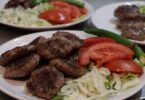F.P. Report
ISLAMABAD: Pakistan has become the 4th largest milk-producing country in the world. But it’s common knowledge that in order to cater to the ever-rising demand for milk, dairy producers never hesitate to adulterate the product by mixing water and using other odd methods to increase its quantity. And the milk that is produced by chemicals is posing a serious threat to human life, on Tuesday.
June 1 is being celebrated as World Milk Day across the globe. The day was marked by the Food and Agriculture Organization of United Nations recognizing the importance of the dairy sector and its role in our lives as a global food source. This year the theme of World Milk Day is: Sustainability in the dairy sector with messages on nutrition.
Over 750 million people are associated with the milk production profession across the globe. They are mostly small-time producers catering to the needs of their livelihood, food security and nutrition.
After 1970, dairy production increased manifold in South Asia and the region started playing a significant role in milk production contributing to almost 200 million tonnes of milk that accounts for almost 20% of total global milk production.
The livestock sector in Pakistan which grew at the rate of 4% in 2018-19 accounted for 11.2% of Gross Domestic Production. The sector not only provides a source of earning foreign exchange but also provides livelihood to 8 million people living in rural areas.
Pakistan is the 4th largest milk-producing country where 80% of milk production comes from rural areas, 15% peri-urban and 5% comes from urban areas. The greater source of milk production in the country is mostly from buffalos. The milk composition stays at 60% buffalo, 36% cow and 4% goat, sheep and camel in 2018-19. 97% milk is being sold in raw form while 3% in pasteurized (UHT) form.
Realizing the importance of the dairy sector, the government of Pakistan is launching massive artificial insemination with imported semen, essentially eliminating local hardy cow breeds that have the potential of producing up to 40 liters of milk daily.
Prime Minister Imran Khan is giving much importance to this sector and is launching a project to increase milk production, setting aside Rs40 billion in order to purchase imported semen, which will help improve the characteristics of local cow breeds and increase per animal milk production to 5,000 liters from present 1,100 liters.






